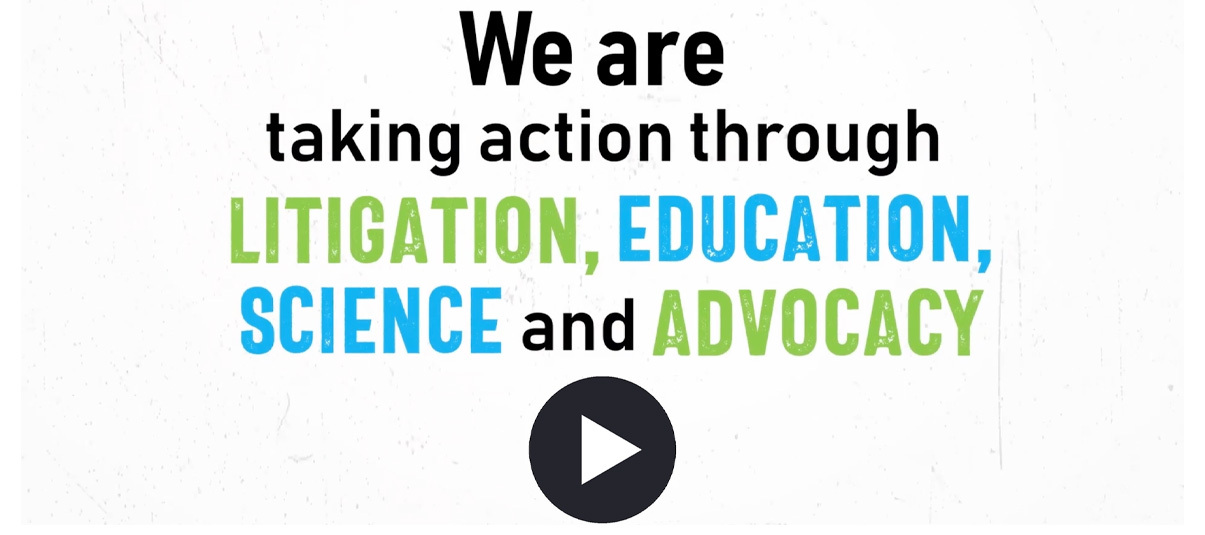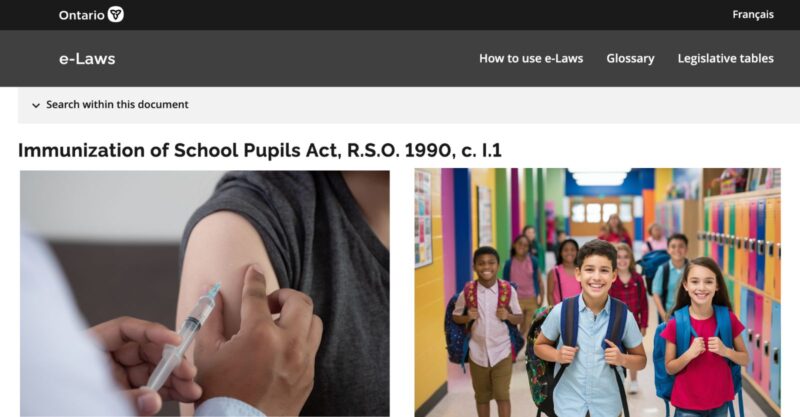Questioning Constitutional Validity of the Ontario Immunization of School Pupils Act
Does the Ontario Immunization of School Pupils Act’ (ISPA) contravene the Canadian Charter if the exemption requirement creates an unnecessary barrier to protected Charter rights?
Section 52 of the charter states, “The constitution of Canada is the supreme law of Canada and any law that is inconsistent with the provision of the constitution is, to the extent of the inconsistency, of no force or effect.”
Therefore, the Immunization of School Pupils Act may be inconsistent with the charter, resulting in it being of no force or effect.
In 1986, the Supreme Court of Canada set out the Oakes Test, a legal test for whether a government action infringing a right under, ‘the Canadian Charter of Rights and Freedoms’ is justified.
The ISPA may fail the Oakes Test because Ontario public health officials have demonstrated they arbitrarily or have easily been able to accommodate some people without undue hardship and in British Columbia Public Health easily accommodates everyone, by not enforcing any exemption paperwork requirement.
Disproportionality of the Ontario Immunization of School Pupils Act (ISPA): The BC reporting regulations show that the Ontario ISPA’s effect is too extreme as a response to obtain the law’s objective, this contravenes section 7 of the Charter of Rights and Freedoms – right to life liberty and security of the person.
Canadian Vaccine regulations by Province – school children
Ontario:
Immunization of School Pupils Act (ISPA) – Immunization of School Pupils Act, R.S.O. 1990, c. I.1 | ontario.ca
Does the regulation apply to teachers or other school staff? No. The regulation only applies to children from kindergarten to age 17. Students age 18 and over and teachers and other staff and volunteers are exempt from being compelled to share their private medical records. (this is the definition of age discrimination and contravenes section 15 of the Charter of Rights and Freedoms)
Medical Privacy Rights: In Ontario Medical Privacy is protected by PHIPA AND FIPPA
PHIPA: Personal Health Information Protection Act, 2004, S.O. 2004, c. 3, Sched. A | ontario.ca
18 (1) If this Act or any other Act requires the consent of an individual for the collection, use or disclosure of personal health information by a health information custodian, the consent,
(a) must be a consent of the individual;
(b) must be knowledgeable;
(c) must relate to the information; and
(d) must not be obtained through deception or coercion. 2004, c. 3, Sched. A, s. 18 (1).
Knowledgable consent is further elaborated in 18 (5) (b) to state
- b) that the individual may give or withhold consent. 2004, c. 3, Sched. A, s. 18 (5).
FIPPA: Freedom of Information and Protection of Privacy Act, R.S.O. 1990, c. F.31 | ontario.ca
In contrast to privacy laws in Ontario: health authorities have NOT established security protocols to ensure only authorized public health staff can access, view, use and disclose confidential immunization information.
- School staff/teachers/administrators are able to access student’s immunization information. School employees contact parents to ask for immunization information on behalf of the health authorities.
- School employees often refuse to register students unless they collect students’ immunization information.
- Public health and school staff do not ensure that all confidential information provided to parents through schools is provided in a sealed envelope. It may be sent in child’s backpack without an envelope.
- In some cases the school bus drivers are given lists of students they are told not to allow on their bus as they are suspended, and it is well known and widely publicized in the media that students are suspended on those specific dates, for lack of vaccine records.
If you choose not to provide your child’s immunization record to public health in Ontario: They do not simply record that your child’s records as unavailable or unknown. Instead, the medical officer of health may order a principal to suspend your child from attending school for 20 days, sometimes repeatedly for months until the parent is coerced into disclosing private medical records, and if parents still refuse to comply, they may be issued a summons under the provincial offences court, for a judge to issue a fine, of up to $1000. However, the law is not clear on which act the student is being suspended under, and there have been zero fines issued to parents, by any judge to date, for parents refusing to provide private medical records to schools or public health officials. When legally challenged, Public Health have officially rescinded (withdrawn) suspensions and then argued the case is legally ‘Moot’ meaning it cannot proceed because there is no longer a case because there is no longer a suspension. However, parents are often paying lawyers thousands of dollars to represent them in these cases that usually result in Public health withdrawing the case, and the experience is a financial hardship to parents, while public health employ taxpayer funded lawyers.
British Columbia:
Public Health Act: Vaccination Status Reporting Regulation – Vaccination Status Reporting Regulation
Does the regulation apply to teachers or other school staff? No. The regulation only applies to children from kindergarten to Grade 12. (this is the definition of age discrimination and contravenes section 15 of the Charter of Rights and Freedoms)
Medical Privacy Rights: In compliance with FIPPA, health authorities have established security protocols to ensure only authorized public health staff can access, view, use and disclose confidential immunization information.
FIPPA: Table of Contents – Freedom of Information and Protection of Privacy Act
- School staff/teachers/administrators are not authorized to review a student’s immunization information. School employees will not be contacting parents to ask for immunization information on behalf of the health authorities.
- School employees will not be reviewing students’ immunization information, nor will the schools establish a database of student’s immunization information.
- Public health staff ensures that all confidential information provided to parents through schools is provided in a sealed envelope. Parents returning information through the schools should ensure their provided information is also returned in a sealed envelope to protect their child’s privacy.
If you choose not to provide your child’s immunization record to public health in British Columbia: under the Public Health Act: Vaccination Status Reporting Regulation (and your child’s record is not already in the provincial registry), your child will be noted as unimmunized in the registry. If there is a vaccine-preventable disease outbreak at your child’s school, your child may be asked to stay home from school until it is safe to return, which may be several weeks. This is important to keep your child safe and to help prevent the outbreak from spreading. Notice they state that ‘if your child’s record is not already in the provincial registry’ if your child’s records have been shared with public health is considered informed consent, to collect and store your child’s private medical records in their digital database. Once your child’s records are there, it is permanent and you cannot remove that information.
*********************************************************************************************************

